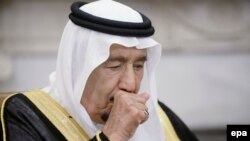The White House says President Donald Trump and Saudi Arabia's King Salman voiced support for the idea of safe zones in Syria and Yemen in an hour-long phone call.
During his campaign, Trump had repeatedly called for Gulf states to pay for establishing safe zones to protect Syrian refugees. He has suggested that he sees their establishment as a way of reducing what he calls a threat of terrorism stemming from refugees and others arriving in the United States from some Muslim countries.
"The president requested and the King agreed to support safe zones in Syria and Yemen, as well as supporting other ideas to help the many refugees who are displaced by the ongoing conflicts," the White House said in a statement after the January 29 call.
Since 2011, Syria has been engulfed in a civil war that has killed more than 300,000 people. In Yemen, at least 10,000 have been killed in a war between Shi'ite Huthi rebels and a Saudi-backed coalition supporting the Sunni-led government, the UN said recently.
The official Saudi Press Agency did not mention safe zones in its report on the call. It said the two had affirmed the "depth and durability of the strategic relationship" between the United States and Saudi Arabia.
The White House said the leaders agreed on the importance of bolstering efforts in the fight against Islamic State (IS) militants.
The Reuters news agency reported that a senior Saudi source familiar with the call did not say if they discussed Trump's executive orders to put a hold on allowing refugees into the United States and to temporarily ban travelers from Syria and six other Muslim-majority countries.
Saudi Arabia is not among the seven countries on the list.
Iran's 'Destabilizing' Activities
The White House said the two also agreed on the need to address "Iran's destabilizing regional activities."
Trump has spoken out sharply against Iranian policies, and predominantly Sunni Saudi Arabia and Shi'ite-led Iran are major rivals in the Middle East.
The White House statement said the two also discussed what it said was an invitation from the king for Trump "to lead a Middle East effort to defeat terrorism and to help build a new future, economically and socially," for Saudi Arabia and the region.
Trump also spoke with Abu Dhabi Crown Prince Sheikh Muhammad bin Zayed al-Nahyan.
The White House said Trump also discussed safe zones and that "the crown prince agreed to support this initiative."








